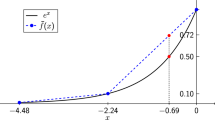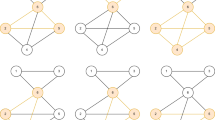Abstract
The multiple knapsack problem (MKP) is a classical combinatorial optimization problem. A recent algorithm for some classes of the MKP is bin-completion, a bin-oriented, branch-and-bound algorithm. In this paper, we propose path-symmetry and path-dominance criteria for pruning nodes in the MKP branch-and-bound search space. In addition, we integrate the “bound-and-bound” upper bound validation technique used in previous MKP solvers. We show experimentally that our new MKP solver, which successfully integrates dominance based pruning, symmetry breaking, and bound-and-bound, significantly outperforms previous solvers on some classes of hard problem instances.
Similar content being viewed by others
References
Caprara, A., Kellerer, H., & Pferchy, U. (2000). A PTAS for the multiple-subset sum problem with different knapsack capacities. Information Processing Letters, 73, 111–118.
Caprara, A., Kellerer, H., & Pferschy, U. (2003). A 3/4-approximation algorithm for multiple subset sum. Journal of Heuristics, 9, 99–111.
Chekuri, C., & Khanna, S. (2000). A ptas for the multiple knapsack problem. In Proceedings of the 11th annual ACM-SIAM symposium on discrete algorithms (pp. 213–222).
Eilon, S., & Christofides, N. (1971). The loading problem. Management Science, 17(5), 259–268.
Fahle, T., Schamberger, S., & Sellmann, M. (2001). Symmetry breaking. In Proceedings of the international conference on constraint programming (pp. 93–107).
Fischetti, M., & Salvagnin, D. (2008). Pruning moves (Technical report).
Fischetti, M., & Toth, P. (1988). A new dominance procedure for combinatorial optimization problems. Operations Research Letters, 7(4), 181–186.
Focacci, F., & Milano, M. (2001). Global cut framework for removing symmetries. In Proceedings of the international conference on constraint programming (pp. 77–92).
Focacci, F., & Shaw, P. (2002). Pruning sub-optimal search branches using local search. In Proceedings of the fourth international workshop on integration of AI and OR techniques in constrain programming for combinatorial optimisation problems (CP-AI-OR) (pp. 181–189).
Fukunaga, A. (2008). A new grouping genetic algorithm for the multiple knapsack problem. In Proceedings of the IEEE congress on evolutionary computation (pp. 2225–2232).
Fukunaga, A., & Korf, R. (2007). Bin-completion algorithms for multicontainer packing, knapsack, and covering problems. Journal of Artificial Intelligence Research, 28, 393–429.
Hung, M., & Fisk, J. (1978). An algorithm for the 0-1 multiple knapsack problem. Naval Research Logistics Quarterly, 24, 571–579.
Ingargiola, G., & Korsh, J. (1975). An algorithm for the solution of 0-1 loading problems. Operations Research, 23(6), 1110–1119.
Kalagnanam, J., Davenport, A., & Lee, H. (2001). Computational aspects of clearing continuous call double auctions with assignment constraints and indivisible demand. Electronic Commerce Research, 1, 221–238.
Labbé, M., Laporte, G., & Martello, S. (2003). Upper bounds and algorithms for the maximum cardinality bin packing problem. European Journal of Operational Research, 149, 490–498.
Martello, S., & Toth, P. (1981a). A bound and bound algorithm for the zero-one multiple knapsack problem. Discrete Applied Mathematics, 3, 275–288.
Martello, S., & Toth, P. (1981b). Heuristic algorithms for the multiple knapsack problem. Computing, 27, 93–112.
Martello, S., & Toth, P. (1990). Knapsack problems: algorithms and computer implementations. New York: Wiley.
Mitchell, D., Selman, B., & Levesque, H. (1992). Hard and easy distributions of SAT problems. In Proceedings of AAAI (pp. 459–465).
Pisinger, D. (1999). An exact algorithm for large multiple knapsack problems. European Journal of Operational Research, 114, 528–541.
Pisinger, D. (2005). Where are the hard knapsack problems? Computers and Operations Research, 32, 2271–2284.
Raidl, G. (1999). The multiple container packing problem: a genetic algorithm approach with weighted codings. In ACM SIGAPP applied computing review (pp. 22–31).
Author information
Authors and Affiliations
Corresponding author
Rights and permissions
About this article
Cite this article
Fukunaga, A.S. A branch-and-bound algorithm for hard multiple knapsack problems. Ann Oper Res 184, 97–119 (2011). https://doi.org/10.1007/s10479-009-0660-y
Published:
Issue Date:
DOI: https://doi.org/10.1007/s10479-009-0660-y




